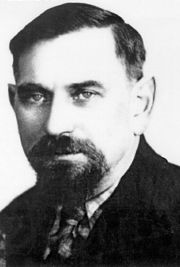Julian Grobelny: Difference between revisions
SPS as well, mislabelled. |
Stable version restored |
||
| Line 28: | Line 28: | ||
==Notes== |
==Notes== |
||
{{Reflist}} |
{{Reflist}} |
||
==References== |
|||
{{Refbegin}} |
|||
* Natalia Bagińska, Natalia Dybowska, Sylwia Kesler, Bartek Koc, Warsaw, Poland: [https://web.archive.org/web/20080511220657/http://www.savingjews.org/righteous/gv.htm Julian Grobelny, RelatioNet GR JU 93 BR PO] |
|||
* Anna Poray, {{webarchive |url=https://web.archive.org/web/20080511220657/http://www.savingjews.org/righteous/gv.htm |date=May 11, 2008 |title=Julian Grobelny, Polish Righteous }}, 2004. |
|||
{{Refend}} |
|||
{{Polish Underground State}} |
{{Polish Underground State}} |
||
Revision as of 06:39, 3 June 2018
Julian Grobelny | |
|---|---|
 Grobelny before World War II | |
| Born | 16 February 1893 |
| Died | 4 December 1946 (aged 53) |
| Nationality | Polish |
| Occupation | Union activist |
| Known for | Holocaust rescue |
Julian Grobelny (16 February 1893 – 4 December 1946) was an activist in the Polish Socialist Party (PPS) from 1915, in the lead-up to Poland's return to independence. During the interwar period he was a social activist. After the Nazi-Soviet invasion of Poland in 1939, and the ensuing Holocaust, he became President of Żegota (Council for Aid to Jews) active in the General Government territory of occupied Poland. The clandestine organization was named after a fictional character Konrad Żegota born on the exact day of its inception in 1942. Grobelny served as president of Żegota until the end of hostilities.[1]
Life
Born in Brzeziny, about 20 kilometres (12 mi) east of Łódź, Grobelny took part in the Silesian Uprisings and worked as an activist among the workers of Łódź in the Second Polish Republic before the war broke out. As soon as the Nazis entered the city however, the Grobelnys found themselves listed as enemies of the Third Reich; went into hiding, and relocated to Warsaw.[2]
Saving Jews
Despite suffering from tuberculosis, Grobelny – together with his wife Halina (born 1900) – was personally involved in the rescue of a large number of Polish Jews during the German occupation of Poland. The couple was famous for their preoccupation with saving particularly Jewish children from the Holocaust by entering the Warsaw Ghetto and walking out with them as their own.[2][3] They harbored over a dozen Jewish PPS activists in their home, and worked in close co-operation with Irena Sendler, head of the children’s section of Zegota. Julian (pseudonym "Trojan") and Halina turned their modest house in Cegłów near Mińsk Mazowiecki into a temporary shelter for Jews until they could be moved into a more permanent place. They offered protection to whoever needed it most, especially those who fled from the Ghetto in Warsaw. The Grobelnys devoted most of their time and energy to rescue work, but also helped Jewish adults by supplying them with “Aryan” papers, money and medicines.[3]
The arrest
In March 1944 the Gestapo arrested Grobelny without knowing about his clandestine work. He survived, thanks to help from physician friends, Dr. Z. Franio, Dr. M. Ropek, Dr. J. Majkowski and Dr. J. Rutkiewicz who were aiding him in prison.[3] Soon after the war ended, Grobelny became mayor of Mińsk Mazowiecki, the location of the Mińsk Mazowiecki Ghetto in German occupied Poland (not far from Warsaw), but died there of tuberculosis a year later, on 4 December 1946.[2] He is buried at a cemetery in Mińsk Mazowiecki. The names of Julian and Halina Grobelny figure prominently in books about humanitarian aid to the Jews of Warsaw and elsewhere during the occupation. On 8 March 1987 Yad Vashem recognized Halina and Julian Grobelny as Righteous Among the Nations.[4]
Notes
- ^ Władysław Bartoszewski (2002), "Help people, don't be afraid!" (Part One), (Part Two) [Nie bój się, pomagaj ludziom (I & II).] Interview with Władysław Bartoszewski by Marian Turski. Polityka Nr 47/2002, Warsaw.
- ^ a b c The RelatioNet Project, Life of Julian Grobelny (Życie Juliana Grobelnego). International reunion of the younger generation with World War II Survivors, October 3, 2007 (in Polish).
- ^ a b c Irena Sendlerowa (2007), "Julian Grobelny i jego żona Helena." FKCh "ZNAK" - 1999-2008. Internet Archive.
- ^ Julian Grobelny – his activity to save Jews' lives during the Holocaust, at Yad Vashem website
References
- Natalia Bagińska, Natalia Dybowska, Sylwia Kesler, Bartek Koc, Warsaw, Poland: Julian Grobelny, RelatioNet GR JU 93 BR PO
- Anna Poray, Julian Grobelny, Polish Righteous at the Wayback Machine (archived May 11, 2008), 2004.

